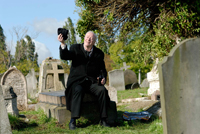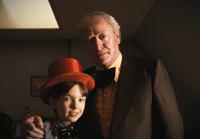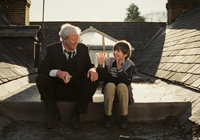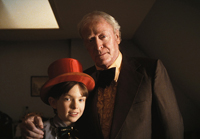Is Anybody There? is one of those unlikely friendship movies. It might even be described as a February-December romance—without the romance. Unapologetically heartfelt and sentimental, the character-driven study uses the relationship between two people—one of them nearing the end of his life and the other just beginning it—to ask some of life’s most probing questions, namely what happens to us after we die. But don’t go to the movie looking for answers. Perhaps the filmmakers understand that such conclusions are better reached in houses of worship or in individuals’ own hearts. Instead, Is Anybody There? has the sentience to know that it is but a small, unassuming comedy and adjusts its stature accordingly.
Clarence Parkinson (Michael Caine) is a grumpy old man. A traveling magician who goes by the moniker “The Amazing Clarence” and putters around the English countryside in a jalopy camper painted like a circus wagon, Clarence arrives at the Lark Hill retirement home and instantly wishes he could make himself disappear. Lark Hall is a tumbledown seaside house converted into a retirement home by its eternally harried owners (Anne-Marie Duff and David Morrissey). The house is full of eccentrics in various states of decrepitude, and Clarence, struggling to maintain his dignity and his mind in the face of merciless old age, clearly doesn’t think he belongs.

Ten-year-old Edward (Bill Milner) couldn’t agree more. The owners’ son, Edward is still bitter about his parents’ decision to turn their home into a boarding house for elderly strangers, and worse yet, being forced him to give up his room and live in what appears little more than a converted closet. Whether it was always an interest or something he picked up after recognizing that the home’s residents never left in anything other than ambulances or hearses, Edward has developed an unhealthy interest in spiritualism and the occult, intent on unlocking the mysteries of death. Desperate to find out what happens when people die, Edward sneaks into dying people’s rooms with a tape recorder in an attempt to capture any aural evidence of the soul’s departure or any other proof of an afterlife. Mopey and decidedly rebellious, the lonely Edward—an island of youth lost in a sea of old age—does not take kindly to the newest addition to the house and does everything in his power to make Clarence’s stay an uncomfortable one.
Of course the pair of displaced outsiders has much more in common with each other than either would like to admit, and despite the initial discontent, they are soon inseparable. Clarence teaches Edward magic tricks to impress the kids at school, where the boy is seen as something of a pariah. Wracked with guilt over a lifestyle of philandering that destroyed his marriage to his now-dead wife, whom he misses terribly, Clarence also teaches Edward hard life lessons. Clarence finds Edward’s attempts to communicate with the dead ridiculous, but this does not stop him, once alone in his room, from trying it himself so that he might apologize to his late wife and plead for her forgiveness. A latter scene gives him his chance, though not in the form his muddled brain first imagined.

As their relationship deepens, we realize that Clarence, who appeared “normal” if a tad scatterbrained when we first met him, is rapidly drifting into senility. The first sign that something is not quite right occurs at a magic show for school children that goes terribly awry, instantly devolving into a moment of absurdist black humor that, like a prairie dog on a vast grassland, continually pokes its head above ground at just the right moments.
The title Is Anybody There? is a philosophical musing. This is a film about mortality. Young Edward is obsessed with discovering where humans go when vacating this mortal coil. Or more particularly, do they hang around before leaving? And if they linger, why? Is Anybody There? is a ghost story without the ghosts. Heaven and hell, while an essential element of anyone’s paranormal research, get the short shrift in favor of questions a bit closer to terra firma.
Which is more important, how we live or how we die? What elements of our youth do we cling to as that “good night” looms ever larger on the horizon? What aspects of the past reorient themselves as we age, some taking on greater prominence than we ever thought possible, others dissipating as we would never have believed. What makes us who we are as we stare down our twilight years and lose the things that once defined us—our spouses, our health, our careers? How do we wrestle with the indignities of aging and the inevitability of death?

Is Anybody There? never really tries to answer any of these questions. There are no long speeches about the meaning of life, no pontificating monologues on what comes after. Perhaps this is the fault of the screenwriter, Peter Harness, whose screenplay is, to some degree, semiautobiographical. Perhaps it is the fault of director John Crowley. Or perhaps, like the very best films, Is Anybody There? sees its place as a conduit to postulate the questions and let the audience formulate its own answers. Is Anybody There? is not one of the very best films, but it is a good one.
If all this makes it sound as if the film is dark and depressing, rest assured, it is not. True, it aims to be a tearjerker, but it balances comedy and pathos, deftly delivering scenes of sweet sentiment and uproarious humor. The magic of Is Anybody There? is due, in no small part, to its leads, the always reliable Caine and relative newcomer and standout Milner, who was last seen in the delightful Son of Rambow.

Caine’s portrayal, with a rich acting legacy to draw upon, is the accumulation of a lifetime of experience. We do not need to imagine the 76-year-old scatterbrained codger as an impish rogue in his youth dazzling packed houses, women dripping from his arms, cocktails flowing into the early morning hours, his marriage dissolving as a result, because we’ve seen it firsthand in Alfie, Sleuth and dozens of other films spanning a 53-year career. I was reminded of watching Peter O’Toole in Venus a few years back, a role similarly imbued with the inspiring weight of a beloved actor’s cinematic history. It is a weight that, while luminous, comes with its share of pain and disappointment. In short, all the ingredients to cast a fully formed human being.
Is Anybody There? features a supporting cast of delicious veteran actors like Peter Vaughan, Leslie Phillips and Rosemary Harris, playing Lark Hall’s dotty residents. While spending any amount of time with great actors is always worthwhile, these roles are little more than cameos. They are there to support the main action, not eclipse it. But one can’t help feeling that, to some degree at least, they were somewhat wasted here.
For all those who believe that emotion in a film instantly makes it sentimental claptrap, Is Anybody There? probably isn’t for you. But for the rest of us, this thoughtful, well-crafted, modest little film is a pleasing example of generational intersections and the wisdom that flows both directions.
Talk About It
Discussion starters- Mirroring Clarence’s regret over unfaithfulness, Edward’s father endangers his own marriage by trying to start an affair with the teenage housekeeper. Why was this subplot important? What did it add, especially in light of Clarence’s confession?
- When we first meet Edward, the rebellious kid is anything but respectful to his parents and elders. How does his attitude change over the course of the film?
- What does the Bible say about occultism, séances, and trying to communicate with the dead?
- What do you believe about the afterlife and on what do you base your beliefs? What do the Scriptures say happen to believers when they die?
The Family Corner
For parents to considerIs Anybody There? is rated PG-13 for language including sexual references, and some disturbing images. The sexual references come in the form of dirty jokes that one of the boarders tells, embarrassing Edward and all others in earshot. Some squeamish viewers may find the sight of a severed finger or the bruised after-effects of a minor car accident difficult to bear. The occultism in the film, including a séance, is never handled with satanic menace, but rather the probings of an inquisitive child who simply wants to connect to those he’s lost. Edward’s father contemplates adultery, even as Clarence recounts the agony such a decision has on both parties.
Photos © Copyright BBC Films
Copyright © 2009 Christianity Today. Click for reprint information.












